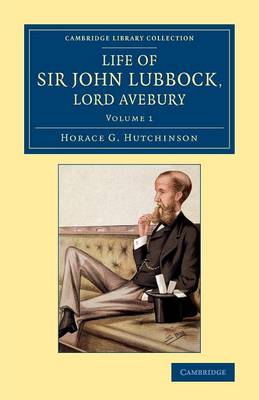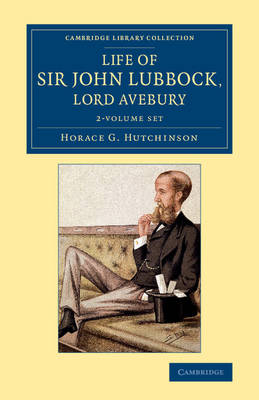Cambridge Library Collection - British and Irish History, 19th Century
1 primary work • 4 total works
Volume 1
The achievements of the polymath Sir John Lubbock (1834–1913) spanned banking, politics, science and philanthropy. First published in 1914, this two-volume biography by Horace G. Hutchinson (1859–1932) traces Lubbock's extraordinary life and career. Hutchinson, who knew his subject in later years, paints a highly favourable portrait of Lubbock's varied accomplishments. Notably, Lubbock became a partner of his father's bank at twenty-two, a Member of Parliament in 1870, and in 1900 received the title of Baron Avebury. Tutored in natural history by Charles Darwin in his youth, he remained fascinated by evolutionary theory: it influenced his archaeological and anthropological work, including Pre-Historic Times as Illustrated by Ancient Remains (1865) and The Origin of Civilisation and the Primitive Condition of Man (1870), both reissued in the Cambridge Library Collection. Volume 1 covers Lubbock's early childhood and private education, his introduction to banking, and Darwin's influence on his passion for science.
Life of Sir John Lubbock, Lord Avebury 2 Volume Set
by Horace G. Hutchinson
Published 30 October 2014
The achievements of the polymath Sir John Lubbock (1834-1913) spanned banking, politics, science and philanthropy. First published in 1914, this two-volume biography by Horace G. Hutchinson (1859-1932) traces Lubbock's extraordinary life and career. Hutchinson, who knew his subject in later years, paints a highly favourable portrait of Lubbock's varied accomplishments. Notably, Lubbock became a partner of his father's bank at twenty-two, a Member of Parliament in 1870, and in 1900 received the title of Baron Avebury. Tutored in natural history by Charles Darwin in his youth, he remained fascinated by evolutionary theory: it influenced his archaeological and anthropological work, including Pre-Historic Times as Illustrated by Ancient Remains (1865) and The Origin of Civilisation and the Primitive Condition of Man (1870), both reissued in the Cambridge Library Collection. Volume 1 covers early childhood and major achievements, while Volume 2 is focused on Lubbock's personal and philanthropic interests in later life.
The achievements of the polymath Sir John Lubbock (1834–1913) spanned banking, politics, science and philanthropy. First published in 1914, this two-volume biography by Horace G. Hutchinson (1859–1932) traces Lubbock's extraordinary life and career. Hutchinson, who knew his subject in later years, paints a highly favourable portrait of Lubbock's varied accomplishments. Notably, Lubbock became a partner of his father's bank at twenty-two, a Member of Parliament in 1870, and in 1900 received the title of Baron Avebury. Tutored in natural history by Charles Darwin in his youth, he remained fascinated by evolutionary theory: it influenced his archaeological and anthropological work, including Pre-Historic Times as Illustrated by Ancient Remains (1865) and The Origin of Civilisation and the Primitive Condition of Man (1870), both reissued in the Cambridge Library Collection. Volume 1 covers Lubbock's early childhood and private education, his introduction to banking, and Darwin's influence on his passion for science.
The achievements of the polymath Sir John Lubbock (1834–1913) spanned banking, politics, science and philanthropy. First published in 1914, this two-volume biography by Horace G. Hutchinson (1859–1932) traces Lubbock's extraordinary life and career. Hutchinson, who knew his subject in later years, paints a highly favourable portrait of Lubbock's varied accomplishments. Notably, Lubbock became a partner of his father's bank at twenty-two, a Member of Parliament in 1870, and in 1900 received the title of Baron Avebury. Tutored in natural history by Charles Darwin in his youth, he remained fascinated by evolutionary theory: it influenced his archaeological and anthropological work, including Pre-Historic Times as Illustrated by Ancient Remains (1865) and The Origin of Civilisation and the Primitive Condition of Man (1870), both reissued in the Cambridge Library Collection. Volume 2 focuses on Lubbock's later life, with Hutchinson remarking that by seventy Lubbock was still politically active and in good health.


